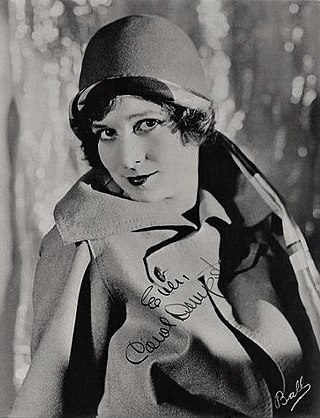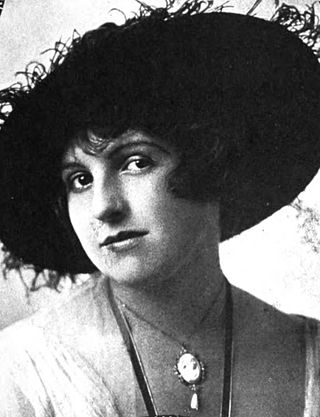
Mae Marsh was an American film actress whose career spanned over 50 years.

Carol Dempster was an American film actress of the silent film era. She appeared in films from 1916 to 1926, working with D. W. Griffith extensively.

John Gustav Adolfi was an American silent film director, actor, and screenwriter who was involved in more than 100 productions throughout his career. An early acting credit was in the recently restored 1912 film Robin Hood.

Herbert Prior was an English silent film actor. He appeared in more than 260 films between 1908 and 1934. He was born in Oxford, Oxfordshire, and died in Los Angeles, California.

The Telephone Girl and the Lady is a 1913 American silent drama film directed by D. W. Griffith.
Two Men of the Desert is a 1913 American short silent Western film written and directed by D. W. Griffith. Based on a story by Jack London, the film was shot on location in Death Valley. Two Men of the Desert is now presumed lost.

The Battle at Elderbush Gulch is a 1913 American silent Western film directed by D. W. Griffith and featuring Mae Marsh, Lillian Gish, and Alfred Paget.
The Lady and the Mouse is a 1913 American short drama film directed by D. W. Griffith. A print of the film survives. Lillian and Dorothy Gish play sisters in the film. The only other two films where the Gishes play sisters are An Unseen Enemy (1912) and Orphans of the Storm (1922).

Paddy the Next Best Thing is a 1923 British silent romance film directed by Graham Cutts and starring Mae Marsh, Darby Foster and Lilian Douglas. It was based on the 1908 novel of the same title by Gertrude Page and a 1920 stage adaptation, which was later adapted into a 1933 American film. It was made at the Gainsborough Studios in Islington. American star Mae Marsh had been brought over from Hollywood to star in the company's previous film Flames of Passion and stayed on to make this film.

Georges Benoît was a French cinematographer who worked on more than sixty films during his career. During the silent era, he was employed mostly in Hollywood. Later he worked in his native France on films such as Jacques Tourneur's Departure (1931). Between 1929 and 1934 he appeared in approximately ten films as an actor.

Over the Hill is a 1931 American Pre-Code black-and-white melodrama film directed by Henry King for Fox Film Corporation. Starring Mae Marsh, James Dunn, Sally Eilers, and Olin Howland, the story concerns a young mother who devotedly cares for her children but when they grow up, most of them turn their backs on her and she has no choice but to go live in the poorhouse. The film is a remake of the 1920 silent film Over the Hill to the Poorhouse, which had been a major box-office hit for Fox. The story was based on a pair of poems by Will Carleton. Over the Hill also inspired the South Korean film adaptation Over the Ridge (1968). The production marked Marsh's first sound film and the second pairing of Dunn and Eilers, who had achieved celebrity in Fox's Bad Girl released earlier in the year.

Gretchen Hartman was an American stage and film actress. She is credited on 67 movies, nearly all silent.

San Francisco Nights is a 1928 American silent drama film directed by Roy William Neill and starring Percy Marmont, Mae Busch, and George E. Stone.

The Tender Hearted Boy is a 1913 American silent black and white drama film directed by D.W. Griffith, written by Lionel Barrymore and starring Robert Harron, Kate Bruce and Mae Marsh.
The Little Tease is a 1913 silent black and white film directed by D. W. Griffith, produced by Biograph Company and starring Henry B. Walthall and Mae Marsh.
Shadows and Sunshine is a 1916 American silent drama film directed by Henry King and starring Marie Osborne, Leon Pardue, and Lucy Payton.

Whom the Gods Destroy is a 1916 American silent drama film directed by J. Stuart Blackton and Herbert Brenon and starring Alice Joyce, Harry T. Morey, and Marc McDermott. A tale set during the 1916 Irish Easter Rebellion against British rule.

The Yellow Dog is a 1918 American silent drama film directed by Colin Campbell and starring Arthur Hoyt, Antrim Short, and Clara Horton.

The Cinderella Man is a 1917 American silent comedy film directed by George Loane Tucker and starring Mae Marsh, Tom Moore and Alec B. Francis. The film's sets were designed by the art director Hugo Ballin.

The Wharf Rat is a 1916 American silent comedy drama film directed by Chester Withey and starring Mae Marsh, Robert Harron, and Spottiswoode Aitken.
















